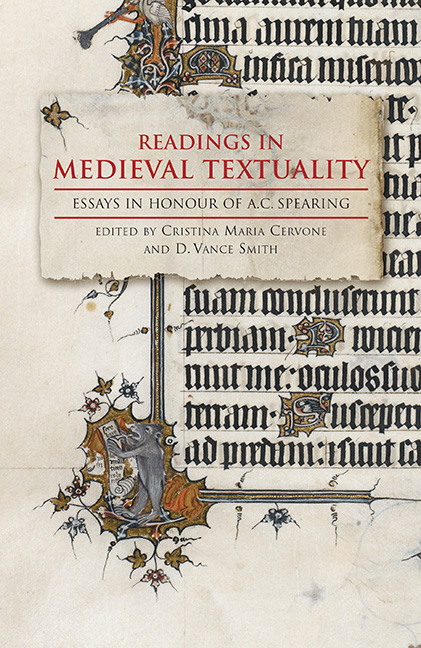Book contents
- Frontmatter
- Contents
- List of Illustrations
- List of Contributors
- A. C. Spearing's Work and Influence
- Bibliography of A. C. Spearing's Works
- I Reading Experience and Experientiality
- 1 The Wife of Bath's “Experience”: Some Lexicographical Reflections
- 2 The Proximity of the Virtual: A. C. Spearing's Experientiality (or, Roaming with Palamon and Arcite)
- 3 Makyng and Middles in Chaucer's Poetry
- II Revisions and Re-visioning of Alliterative Poetry
- III Subjectivity and the Self
- IV Reading for Form
- V Epilogue
- Works Cited
- Index
- Tabula Gratulatoria
2 - The Proximity of the Virtual: A. C. Spearing's Experientiality (or, Roaming with Palamon and Arcite)
from I - Reading Experience and Experientiality
Published online by Cambridge University Press: 25 October 2017
- Frontmatter
- Contents
- List of Illustrations
- List of Contributors
- A. C. Spearing's Work and Influence
- Bibliography of A. C. Spearing's Works
- I Reading Experience and Experientiality
- 1 The Wife of Bath's “Experience”: Some Lexicographical Reflections
- 2 The Proximity of the Virtual: A. C. Spearing's Experientiality (or, Roaming with Palamon and Arcite)
- 3 Makyng and Middles in Chaucer's Poetry
- II Revisions and Re-visioning of Alliterative Poetry
- III Subjectivity and the Self
- IV Reading for Form
- V Epilogue
- Works Cited
- Index
- Tabula Gratulatoria
Summary
This living hand … see here it is –
I hold it towards you.
(John Keats)That is how a picture is attached to reality; it reaches right out to it.
(Ludwig Wittgenstein, Tractatus Logico-Philosophicus)Recognition is an event that involves both proximity and distance. When something distant suddenly comes near and is understood to be something known, it generates surprise and often engages the emotions. This effect is exploited in the literature collected for us by A. C. Spearing's two most recent books, Textual Subjectivity and “Son of Textual Subjectivity,” as he sometimes calls Medieval Autographies. Spearing analyzes the effect of nearness (the linguist's “proximality”) in medieval writing with recourse to what the narrative theorist Monika Fludernik would call “experientiality” and what the Slavicist Gary Morson, celebrating the random and improvisational quality of the real world, calls “life ‘as it is experienced’.” By opening up and collapsing temporal and spatial distance with the deictic strategies of language, medieval autography serves to unmoor subjectivity from persons and so allows it free play in passages that are often momentary, metacritical, abject, responsive, improvisational. Spearing's literary historical claim is large and persuasive, and in it we recognize something that the field knew (but often misunderstood, by lumping it in with the “dramatic” characterization lauded by George Kittredge and others): that in the late Middle Ages authors begin to value and practice strategies for producing “experientiality.” This essay considers the effects of such a production of experientiality, especially in Chaucer's experiments with love, anger, and other affective states in the Knight's Tale. I take the practice of “roaming” described by the poem as an investigation of the relation between bodily experience and language, one pertinent both to the history of literature and to the history of emotion. A primary effect of the strategies Spearing traces is the reader's pleasure; I will be heretically interested here in the uses to which that pleasure seems directed by Chaucer's art.
- Type
- Chapter
- Information
- Readings in Medieval TextualityEssays in Honour of A.C. Spearing, pp. 15 - 30Publisher: Boydell & BrewerPrint publication year: 2016

